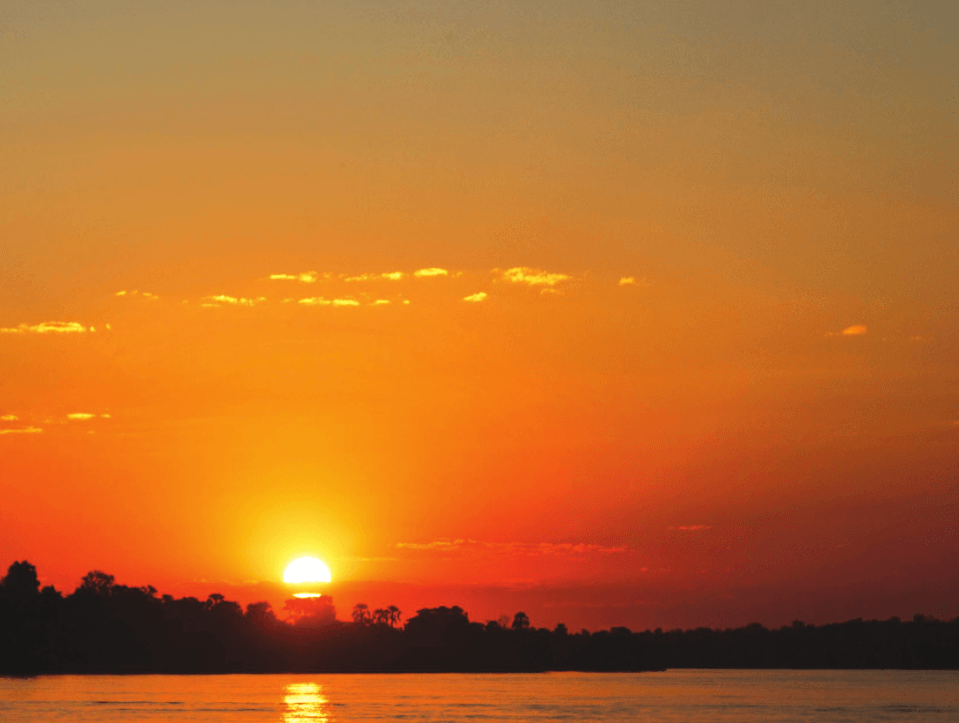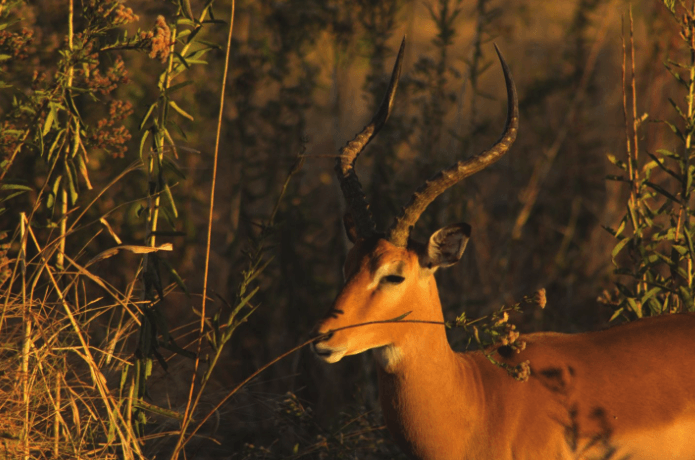Featured
UM Alum Guides Photographic Safaris To Boost Zimbabwe Tourism
At home in Zimbabwe, Waters nurtures beneficial relations between wildlife and people.
*This story was republished with permission by The Meek School Magazine.
 Rob Waters (’84) loves cherry pie. He said he ate plenty during his year at Ole Miss and hasn’t had any to match since. He says the cherries in his native Zimbabwe just aren’t the same.
Rob Waters (’84) loves cherry pie. He said he ate plenty during his year at Ole Miss and hasn’t had any to match since. He says the cherries in his native Zimbabwe just aren’t the same.
Waters is a slender man with thin-rimmed glasses, a baseball cap, and a love for his homeland. He remains even-tempered at all times, barely speaking above the volume of a whisper, but when he does speak he draws people in. He grew up surrounded by nature, and although he likes to leave every so often, he always returns home.
Waters, 54, graduated from the University of Zimbabwe in 1983 with an English degree. During his final year as an undergrad, he began looking toward the future. He knew he didn’t want to be a teacher, and so he pondered other options.
 “What do you do with an English degree if you’re not going to teach? I obviously thought about journalism,” Waters said. “It uses my love of English and I would be able to write creatively.”
“What do you do with an English degree if you’re not going to teach? I obviously thought about journalism,” Waters said. “It uses my love of English and I would be able to write creatively.”
He took pen to paper and wrote letters to universities across the world, including England, Canada and a “heap” in the United States.
“America in that stage was way ahead of the rest of the world in terms of formal academic training in journalism,” Waters explained.
Ole Miss was the first to respond to Waters’ letter with a financial offer. He said that was the key to his travel to the U.S.
As an English major, Waters had read all of William Faulkner’s novels. Before arriving in Oxford, home of the Nobel Prize-winning author, he already had a complete picture painted in his head. And when he arrived, every detail came to life.
 Waters said he loved Southern culture — the food, the land, the literary tradition and the architecture. The typical culture shock that strikes anyone visiting Oxford who didn’t grow up in Mississippi, especially involving race relations, never hit Waters. He said he chose to take on the role of an observer during his 1983-84 academic year in Mississippi.
Waters said he loved Southern culture — the food, the land, the literary tradition and the architecture. The typical culture shock that strikes anyone visiting Oxford who didn’t grow up in Mississippi, especially involving race relations, never hit Waters. He said he chose to take on the role of an observer during his 1983-84 academic year in Mississippi.
“I didn’t really judge it at all. I didn’t think, ‘Is it good? Is it bad? Have they moved forward from 100 years ago? Are they moving backwards?’”
To him, Zimbabwe and Mississippi aren’t that different. The African nation, formerly Rhodesia, bore the name of British empire-builder Cecil Rhodes until 1979 and the indigenous blacks were regarded as a servant class, much as African-Americans were in the United States until changes began with the civil rights movement.
“If I had come from Britain, I might have found it a bit heavy,” Waters said. “But coming from Africa, I was already well-versed in all of the racial interaction issues and how we deal with each other as races. Some good, some bad.”
As it has emerged, Zimbabwe has had periods of great progress as well as great turmoil.
 The combination of growing up in a country with racial tensions and reading heavily in Faulkner made everything click in Waters’s mind.
The combination of growing up in a country with racial tensions and reading heavily in Faulkner made everything click in Waters’s mind.
“In some ways, and I can’t be specific here, but the gut feel is that the Deep South was ahead of Rhodesia/Zimbabwe; Zimbabwe/Rhodesia was in those days and in some ways actually behind,” Waters reflected. “There’s always this (situation of) how the races are dealing with each other and dealing with the challenges they give each other, and the opportunities they deny each other just by their numbers.”
Waters added that if he had enrolled in a college in New York or Los Angeles it might’ve made him crazy, but to be in America, Mississippi was the right fit.
After a few introductory journalism courses to gain basic skills and hours upon hours dedicated to graduate classes, Waters graduated from Ole Miss with a master’s degree in journalism. And he faced the same issue he had faced just a couple of years before: He had a new degree, yet not the faintest idea of what to do with it.

Waters, right, talks with Assistant Professor Mikki Harris as the moon rises behind a termite mound in Hwange National Park, Zimbabwe. Harris led students on a photo expedition to explore the relationships between the people of the region and the abundant wildlife.
Journalism as a career path would have been denied to Waters in Zimbabwe for multiple reasons, including the difference between the free-press American journalism he had studied at Ole Miss and the closely watched, government-owned media in Zimbabwe. Even though he was uncertain about everything else, he knew one thing for sure. He knew he wanted to go home.
“I already knew nearly 100 percent that I wanted to spend my life (in Zimbabwe),” Waters said. “It was my home and it’s still my home. I still completely feel the same way. This is a place where I hope to spread my ashes or bury my bones, whatever the case may be.”
After touring through Britain and passing through Australia as pit stops, Waters returned to Zimbabwe, a landlocked country in the southeast portion of Africa. He applied for jobs and was even short-listed for one in commerce. It was a good job, but it wasn’t what he wanted to do the rest of his life.
Fate lent a hand and Waters stumbled across an advertisement in a local newspaper. A young safari guide was needed, and no experience was necessary.
Waters fit the bill perfectly.

Waters introduces Ole Miss students to Johnson Ncube, center, head man of the village, and his wife, Dorothy. They explained local culture as well as the relationship of the 1,000 subsistence farmers and their families with the wild animals in an adjacent national park in central Zimbabwe.
“I applied and was given a job, so my first salary-paid job was actually as a safari guide. Hallelujah,” Waters said. “What a privilege it was to be a guide and to be out in the bush, as we call it. I was outdoors and enjoying my life.”
The job was in Hwange National Park, where he still spends a lot of time. He learned mostly from on-the-job training and interacting with the other guides, especially his boss. He went to work wanting to learn more and absorbed everything he could.
Waters has always been fascinated with wildlife; it’s a huge part of who he is.
Born in Bulawayo but raised and educated in Salisbury, the capital of Rhodesia — now known as Harare, capital of Zimbabwe — Waters’s home was in a rural, scenic area. He was coming of age at the end of an era in his country, but is conscious that he had a privileged childhood and upbringing.

Waters, left, relaxes with the manager of Camelthorn, one of several Imvelo Safari Lodges. Waters is an executive for the company that promotes tourism as as tool to protect wildlife and help the people in his homeland, Zimbabwe. The resort is named for the giant camelthorn tree in the photo.
Waters lights up when he talks about his childhood, especially in school. School was where the teachers cared about him and were heavily involved with the students, “filling their lives up with opportunities indoors and outdoors.”
Indoors, Waters was a writer with a talent in English, but outdoors he was a wildlife guide in training.
As soon as he was old enough, he read all sorts of wildlife magazines and shared a pastime of reading books about birds or trees or flowers with his mother.

Days at Imvelo Safari Lodges begin and end at the fire pit, with tea and conversation.
“It’s something that’s in your system,” Waters said. “I think growing up in that outdoorsy, rural environment sparked something in me.”
The spark is still burning after more than a decade in non-hunting safari operations, although he is careful to point out that ethical hunting camps are important to wildlife management and preservation, too. Waters has also had work experience in hotel management, as an inbound tour operator, and in venues of public relations and journalism.
Now he is the operations and projects manager for Imvelo Safari Lodges. Imvelo’s slogan is “connecting people with nature” and aims to boost tourism in Zimbabwe through photographic safaris. Several of its small, luxury lodges are in Hwange, where animals roam free and hunting is forbidden.
Waters believes the development of tourism is critical to the survival of wild areas. He said the tourism industry in Zimbabwe hit a major peak in the late 1990s after Nelson Mandela came to power in next-door South Africa, attracting international visitors. He hopes Zimbabwe tourism will grow and expand once more.

Waters joins Ole Miss students on a photo safari in Hwange National Park, where he was once a guide.
“It’s a hard sale to sell Zimbabwe in America right now, but it’s not as bad as it used to be,” Waters said. “Attitudes are changing and we really are in an interesting situation right now where the future could be very, very bright very, very soon.”
By Lana Ferguson, a junior, print journalism major from Mechanicsville, Virginia. Photos by Lana Ferguson and Charlie Mitchell.
The Meek School Magazine is a collaborative effort of journalism and Integrated Marketing Communications students with the faculty of Meek School of Journalism and New Media. Every week, for the next few weeks, HottyToddy.com will feature an article from Meek Magazine, Issue 4 (2016-2017).
For questions or comments, email us at hottytoddynews@gmail.com.
Follow HottyToddy.com on Instagram, Twitter and Snapchat @hottytoddynews. Like its Facebook page: If You Love Oxford and Ole Miss…






























cs joshi
December 26, 2017 at 2:52 am
“America in that stage was way ahead of the rest of the world in terms of formal academic training in journalism,” Waters explained.